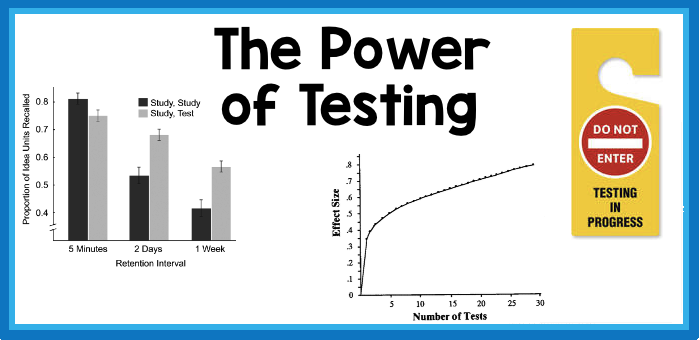“If you read a piece of text through twenty times, you will not learn it by heart so easily as if you read it ten times while attempting to recite from time to time and consulting the text when your memory fails” Francis Bacon, 1620
In four hours you have a Spanish quiz. You’ve procrastinated, and now need to learn 100 new words.
You can:
-
- A) Review the 100 words for 4 hours
-
- B) Review the 100 words for 3 hours, trade for a blank sheet of paper and take 1 self-test
-
- C) Review for 2 hours, take 2 self-tests
- D) Review for 1 hour, take 3 self-tests
What is the most optimal strategy?
Testing, Testing, 1, 2, 3
Perhaps surprisingly, option D turns out to be the best strategy. In fact, studies give a 5:1 memory benefit of testing over studying.
There are an incredible amount of studies that support what is known as the Testing Effect, or the idea that testing produces deep encoding and leads to much longer retention than simple studying.
While the effect has long been studied amongst psychology researchers, it has only recently been applied to the world of education.
Let’s Look at the Research
At the University of Washington in 2006, cognitive psychologist researchers Roediger and Karpicke sought to see if the testing effect could be applied to their own students. They
wanted to verify whether or not:
- The Testing Effect worked in a classroom setting, and
- Whether or not More Tests = More Learning
Testing in the Classroom?
180 students were given passages to read during 7 minutes. They would either:
1) Study one of the passages
2) Restudy one of the passages (Study, Study)
3) Take a recall test (Study, Test)
The final retention test was taken: after 5 minutes, after 2 days, and after 1 week.

We see a ‘slight’ benefit of studying only after five minutes, that is completely lost after only two days. Cramming (or ‘over learning’) works if you’re going to take a test immediately, but is completely useless for language learning!
More Tests == More Learning
Not satisfied with simply confirming that the testing effect works in educational settings, Roediger and Karpicke wanted to see if more tests lead to higher retention.
Using similar methodology, the researchers this time used three conditions:
1) Study only (SSSS)
2) Study, then test (SSST)
3) Study, with three recall tests (STTT)

Clearly, testing yourself leads to better retention, and the more tests you take, the better.
What can explain such an effect?
Comprehension vs. Production (AKA ‘Retrieval Hypothesis’)
“One explanation for why tests that require production, or recall, of material lead to greater testing effects than tests that involve identification, or recognition, is that recall tests require greater retrieval effort or depth of processing than recognition tests (Bjork, 1975; Gardiner et al., 1973). Bjork (1975) argued that depth of retrieval may operate similarly to depth of processing at encoding (e.g., Craik & Tulving, 1975), and that deep, effortful retrieval may enhance the testing effect.” (Roediger, 2006)
More testing = Greater Retrieval Depth = Encoded at a ‘deeper level’
If you’re not convinced, here’s a sampling of various other studies conducted by various psychology researchers.
Fortunately, the ACA Method takes this principle to heart, and testing is a fundamental aspect of every class. So get testing!






Pingback: Motivating Students with Cumulative Exams and Cumulative Learning